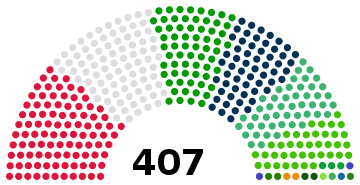Elections in Algeria
This article needs to be updated. (February 2014) |
 |
|---|
|
|
|
|
Algeria elects on the national level a head of state – the president – and a legislature. The president is elected for a five-year term by the people. People's National Assembly (Assemblée Populaire Nationale) has 407 members, elected for a five-year term in multi-seat constituencies by proportional representation. Eight seats in the national assembly are reserved for Algerians abroad. The Council of the Nation (Conseil de la nation) has 144 members, 96 members elected by communal councils and 48 members appointed by the president.
Algeria has a multi-party system, with numerous political parties in which no one party often has a chance of gaining power alone, and parties must work with each other to form coalition governments.
According to the U.S Department of State, the elections are well organized and conducted without significant problems or irregularities, but they noted restrictions on civil liberties during the election period and lack of transparency in vote-counting procedures.[1]
Until 12 November 2008, presidents were limited to two terms; on this date, amendments to the constitution were passed which removed the term limits. Term limits were later reinstated in the 2016 constitution reform by President Abdelaziz Bouteflika.
The last legislative election was held on 12 June 2021.
Latest elections
[edit]Presidential election
[edit]| Candidate | Party | Votes | % | |
|---|---|---|---|---|
| Abdelmadjid Tebboune | Independent | 4,947,523 | 58.13 | |
| Abdelkader Bengrina | National Construction Movement | 1,477,836 | 17.37 | |
| Ali Benflis | Vanguard of Freedoms | 897,831 | 10.55 | |
| Azzedine Mihoubi | Democratic National Rally | 619,225 | 7.28 | |
| Abdelaziz Belaïd | Future Front | 568,000 | 6.67 | |
| Total | 8,510,415 | 100.00 | ||
| Valid votes | 8,510,415 | 87.24 | ||
| Invalid/blank votes | 1,244,925 | 12.76 | ||
| Total votes | 9,755,340 | 100.00 | ||
| Registered voters/turnout | 24,464,161 | 39.88 | ||
| Source: Journal Officiel Algérie | ||||
Legislative elections
[edit]The election saw the lowest turnout of those held for the legislature in Algerian history (only the 2020 Algerian constitutional referendum saw a lower turnout overall), with under 23% of the eligible population participating. The governing National Liberation Front won a plurality of seats, although both it and coalition partner Democratic National Rally saw heavy losses. The nationalist Future Front, the Islamist Movement of Society for Peace, the new National Construction Movement and independents all saw large gains at their expense, while other entities saw minor changes. A total of 136 seats were won by candidates under the age of 40, 35 were won by women, and 274 were won by those with a tertiary education.
Following the elections, a coalition was formed by the National Liberation Front, Democratic National Rally, Future Front, and National Construction Movement, as well as several members from independent lists.
 | |||||
|---|---|---|---|---|---|
| Party | Votes | % | Seats | +/– | |
| National Liberation Front | 287,828 | 6.24 | 98 | –66 | |
| Movement of Society for Peace | 208,471 | 4.52 | 65 | +32 | |
| Democratic National Rally | 198,758 | 4.31 | 58 | –42 | |
| Future Front | 153,987 | 3.34 | 48 | +34 | |
| National Construction Movement | 106,203 | 2.30 | 39 | New | |
| Voice of the People | 13,103 | 0.28 | 3 | +2 | |
| Freedom and Justice Party | 10,618 | 0.23 | 2 | 0 | |
| New Algeria Front | 7,916 | 0.17 | 1 | 0 | |
| Justice and Development Front | 7,667 | 0.17 | 2 | – | |
| New Dawn | 7,433 | 0.16 | 2 | New | |
| Dignity Party | 5,942 | 0.13 | 1 | –2 | |
| Good Governance Front | 3,724 | 0.08 | 2 | New | |
| Jil Jadid | 3,576 | 0.08 | 1 | New | |
| Algerian National Front | 1,207 | 0.03 | 1 | +1 | |
| Minor independent lists that won seats | 256,732 | 5.57 | 84 | +56 | |
| Others | 3,337,487 | 72.39 | 0 | – | |
| Total | 4,610,652 | 100.00 | 407 | –55 | |
| Valid votes | 4,610,652 | 82.01 | |||
| Invalid/blank votes | 1,011,749 | 17.99 | |||
| Total votes | 5,622,401 | 100.00 | |||
| Registered voters/turnout | 24,453,992 | 22.99 | |||
| Source: Official Algerian Journal[2] | |||||
See also
[edit]References
[edit]- ^ "Algeria". United States Department of State. Archived from the original on 2023-10-03. Retrieved 2024-01-20.
- ^ "Journal Officiel de la Republique Algerienne № 51" (PDF) (in French). Secretariat General du Gouvernement. 29 June 2021. Retrieved 31 August 2021.
